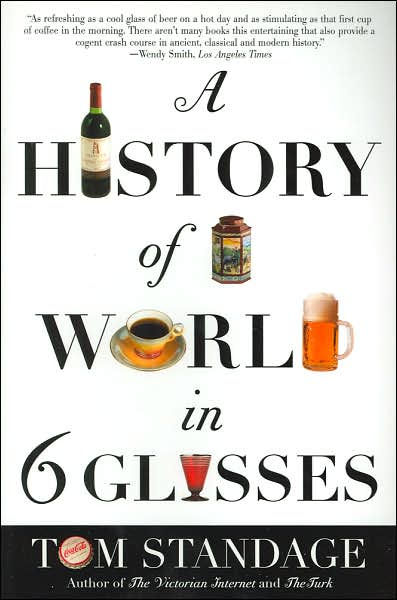A History of the World in 6 Glasses Summary

7 min read ⌚

How Your Favorite Drinks Changed the World
Whether you’re drinking wine or beer, or prefer non-alcoholic beverages such as coffee and Coca-Cola, chances are you’ve never spent even a minute to reflect on how they got to your table. Tom Standage has spent few years of his life.
His conclusions?
That, in fact, you can tell the history of our world by telling the history of six of our favorite drinks. In this manner, “A History of the World in 6 Glasses” is a unique book. It doesn’t really talk about wars and revolutions – and yet, it talks about changes.
Drinks caused important global events. Did you know that? Would you want to learn it?
Learn it with us – in about a thousand words!
Who Should Read “A History of the World in 6 Glasses”? And Why?
There are three answers to these questions.
The first one is a bit obvious. If you are a beer enthusiast, a wine connoisseur, coffee addict, tea fanatic, spirits fan, or a Coca-Cola lover – you’ll certainly want to read this book. Or at least two chapters of it, concerning the beverage of your choice.
The second answer is less apparent but as spot on: historians. Especially those who want to read about the events they already know – from a different perspective.
Finally, the third answer is the most interesting one: trivia aficionados. So, if you’re one of those people who reads books for fun, and if you are interested in details you have no practical use of, you’ll find plenty of them in “A History of the World in 6 Glasses.”
About Tom Standage
 Tom Standage (1969) is a British journalist and author. An Oxford graduate (engineering and computer science), he has worked for The Guardian and The Economist and has been published in The New York Times and Wired.
Tom Standage (1969) is a British journalist and author. An Oxford graduate (engineering and computer science), he has worked for The Guardian and The Economist and has been published in The New York Times and Wired.
Standage is interested in history analogies and lesser-known aspects of history. In addition to “A History of the World in 6 Glasses”, he has written “An Edible History of Humanity,” “The Victorian Internet” and three more history books.
You can find more about him at his website.
“A History of the World in 6 Glasses Summary”
Who knew that the history of the world could be recounted in the history of six drinks?
Tom Standage did. And he does it in 300 pages, about 50 pages and two sections per drink, totaling twelve of the most attention-grabbing book chapters you’ll ever read.
Let’s summarize them a drink by drink.
1. Beer
The beer was accidentally discovered as early as the Ice Age in the Fertile Crescent (it’s somewhere around here). People there find out that gruel made from grains soaked in water turned into an intoxicating drink after a couple of days.
They loved it! So, they decided to produce it.
Here’s where it gets really interesting!
This is one of the reasons why they decided to settle, farm, and eventually store grains. You’ve read that right! If not for that sparkling feel in your mouth when drinking beer, people might have never discovered agriculture.
No wonder then that the poet of “The Epic of Gilgamesh,” the world’s oldest work of literature, describes beer as “the drink of the civilized man.”
Beer might be one of the reasons we have a civilization in the first place.
2. Wine
Not so much for the Ancient Greeks, though. You see, they didn’t like beer.
Who knows? They might have known that beer was as old as the Neanderthals and considered themselves too new age for it. Also, their climate was as good as it gets. So, they went for another drink: wine.
Half of Ancient Greek literature and philosophy may be written or orally transmitted in a state of slight intoxication. Wine was the drink of choice for the intellectuals. Who knows how many famous poems they have written to celebrate its effects?
But, not everyone could afford it. It was expensive, and it was one of the ways the Greeks disseminated their culture all around. The myth of Dionysus, their god of wine, is evidence enough: it’s ever-present throughout the Mediterranean.
When the Ancient Romans invaded the Balkan Peninsula, wine became a symbol of democracy. It was cheap and was enjoyed by both rulers and slaves. But, some types were deemed better than others and were reserved for the high class.
Because, as is the case in all democracies, the rich are a bit more equal.
3. Alcoholic Spirits
Interestingly enough, these were invented by the Arabs. Due to religious reasons, however, they never really got to drink them. The Europeans, on the other hand, loved them.
Why?
Blame it on alchemical pseudoscience and sugar cravings! And blame part of Europe’s conquest of the Americas on their desire to acquire more sugar.
Spirits played a part in the American War of Independence too. The Molasses Act of 1733 asked Americans to pay taxes on molasses imported from non-British colonies.
The Americans ignored the Act and went on smuggling in French molasses.
Though, the independence of the United States – as everybody knows – is much more related to another drink.
But, we’ll get to that later!
4. Coffee
First off – coffee!
Once again invented in the Arab world, coffee became popular in Europe during the seventeenth century.
And you won’t believe how!
It was because of contaminated water and wine. People made coffee and wine with boiling water, so, at this point in history, they were safer to drink than water. However, intellectuals wanted to be sober from time to time, so they preferred coffee.
Fast forward few decades and coffeehouses are suddenly alive with spirited intellectual debates and political vigor!
Charles II – who, ironically, attempted to shut down coffeehouses – wouldn’t have returned from exile if coffeehouses hadn’t granted an unprecedented freedom of speech to the intellectuals.
Even more: the French Revolution started in the coffeehouses of Paris. Maybe, if it weren’t for coffee, we would have never had the songs of “Les Mis”!
5. Tea
Tea was also a drink related to social status.
It was drunk for centuries in China, but it became fashionable once the royal dynasties of Europe started drinking it. The lower society strata always want to imitate the higher classes, so they started drinking tea too.
Suddenly, everybody was drinking tea in Britain. And since Britain was the largest colonial force in the world, tea was all the rage wherever you were on the face of the planet.
In addition to making the lives of the poor a bit better – it helped workers stay awake and healthy – tea also made the rich richer. The East India Company, especially. It employed a small country and earned more than the British government itself.
However, when the Tea Act of 1773 allowed the company to export tea to the Americas tax-free, enough was enough for the American revolutionaries.
Boston Tea Party, anyone?
6. Coca-Cola
If spirits and tea incited America to fight for its independence, Coca-Cola helped her dominate the world.
Originally intended for medicinal purposes, John Pemberton’s drink soon grew to become America’s favorite drink. However, nobody had even heard of it before the Second World War on the other side of the Atlantic and the Pacific.
And then it happened!
The first of Coca-Cola’s great marketing campaigns. Robert Woodruff, then-CEO of Coca-Cola, ordered that “every man in a uniform gets a bottle of Coca-Cola for 5 cents, wherever he is and whatever it costs the company.”
The rest, as they say, is history.
Here’s one fact you may find nowhere else: Georgy Zhukov, the most famous Soviet general of World War II, liked Coca-Cola so much that he asked the company if they could make it colorless so that he can smuggle it for vodka.
It was the Cold War, you see, and Coca-Cola was the symbol of the United States.
Half a century later – it still is.
Key Lessons from “A History of the World in 6 Glasses”
1. Each Glass Has Its Own History
2. Drinks Can Change the World
3. Nothing Wrong to Like Your Drinks
Each Glass Has Its Own History
“A History of the World in 6 Glasses” is not exactly a history of the drinks in your glass. It’s a history of the human civilization told through a different prism.
However, it’s great that you can have a different viewpoint from time to time when telling the story of humanity. That way, you’ll never forget that, as much as it is a story of great leaders and merciless wars, history is also a story of the little things.
Such as your coffee.
Drinks Can Change the World
Interestingly enough, these little things are not as little if scrutinized in detail.
Suddenly, you realize that for the American citizens of the 18th century, there was nothing more important than their rum and tea.
Just think about it!
Wouldn’t you go out on a protest if the government bans you from drinking coffee in the morning or Coca-Cola while watching a movie?
See you at the barricades!
Nothing Wrong to Like Your Drinks
If Tom Standage’s book can teach you anything, it can certainly teach you that whatever you’re drinking at this moment, was – and is – adored as a drink by millions and millions of people. It has either made people’s lives better, and/or has brought down powerful empires.
So, drink your beverage carefree.
That is, if you’re moderate.
Like this summary? We’d Like to invite you to download our free 12 min app, for more amazing summaries and audiobooks.
“A History of the World in 6 Glasses” Quotes
Fermentation and civilization are inseparable. (via John Ciardi) Share on X Whether in stone-age villages, Mesopotamian banqueting halls, or modern pubs and bars, beer has brought people together since the dawn of civilization. Share on X Wine displaced beer to become the most civilized and sophisticated of drinks—a status it has maintained ever since, thanks to its association with the intellectual achievements of Ancient Greece. Share on X Appreciation of wines from different places began with the Greeks, and the link between the type of wine and the social status of the drinker was strengthened by the Romans. Share on X Rum was the liquid embodiment of both the triumph and the oppression of the first era of globalization. Share on XOur Critical Review
“A History of the World in 6 Drinks” is written in a charming and absorbing style and is everything but boring from start to finish. Neatly divided into twelve easy-to-digest chapters and six parts, the book guides the reader from the Ice Age to the Second World War without ever sounding tiresome or dull.
Too bad we didn’t have an opportunity to learn history from books such as this! It would have certainly made those classes much more interesting and the students much more attentive.
But, then again, it’s never late to fix this.








